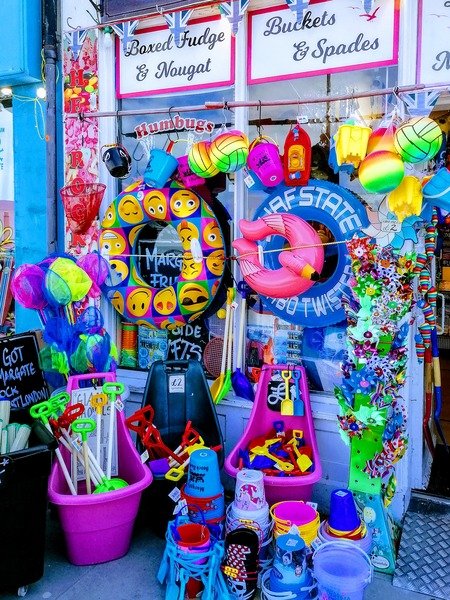I take a night flight to England, which proves to be an awful journey - packed to capacity, with me seated in front of two screaming children and a mother at her wit’s end. I finally throw myself upon the mercy of a stewardess, explain my personal situation and she gives me her ‘landing seat’ at the back of the plane, where at least I can gather my thoughts.
By the time I’ve left the airport, caught a train into central London then found a cab to my friends’ house, it’s almost 5.30 am and grey light is seeping through the sky. I thank them as they open the door at this ungodly hour, head for the shower, then grab a few hours of sleep because I know I’m going to need all my strength for what follows.
On the train, en route from London to Canterbury (where my father is hospitalised) I notice that It’s a glorious day. Urban density soon gives way to attractive countryside - it’s not for nothing that Kent is named the ‘Garden of England’. My carriage is packed with holidaymakers, all laughing and joking, ready to soak up some summer sun at one of the beaches on the south coast. I envy their carefree state.
At the hospital’s stroke unit, when I buzz at the door, I'm let straight in and taken to a nurse who hands me a full PPE set - gown, mask, visor and gloves since, in addition to his stroke and brain bleed, my father has covid, which makes his situation even more complex. I dress up, as requested, feeling unnerved, then push the handle of his door.
I am caught off guard when I see him. He looks terrible. I do my best to hide my shock, pulling up a chair, forcing a smile and taking his hand. My father recognises me immediately and seems astonished that I’m standing next to him. He can’t speak properly - he’s slurring his words - nor can he sit up. He is utterly helpless and fights to get his words out.
“You’re not in Israel?”
“No dad, I came to see you.” I squeeze his hand tightly and he responds in kind. Then he whispers, almost inaudibly,
“Get me out of here.”
His helplessness and despair hit me like a tonne of bricks. His eyes are watery, his face etched with frustration and despite the fact that he is a large, strong man, he is struggling to move his arms. My father has always been incredibly independent - he hates asking anyone for anything - so to find himself in this hospital bed, and be well aware of his situation, must be a truly terrible experience for him. I am determined not to cry - It is inconceivable that he should see this. Out of the corner of my eye, I see him motioning for his wallet, on a side table, and gesturing for me to open it. He counts three on his fingers - and, when I look, I understand this stands for the three credit cards inside.
“I’ll make sure they’re kept safe, dad. Just rest - I’m going to talk to the doctor now.”
Outside, I tear off the PPE, which is hot and oppressive (increasing my admiration for NHS staff who wore it for hours straight, in the midst of the pandemic). Tears are streaming down my face - I’m not prepared for any of this. I knew my father wasn’t well but to see him like this is far beyond what I thought I’d have to cope with. My mind is racing and filled with images - he and I together when I was a kid; the two of us wandering through Jerusalem, towards the Western Wall; hanging out at the beach a few weeks ago, joking over ice creams.
And now this.
I meet a young doctor (the consultant has been and gone) who senses my shock and tries to answer my endless questions as best he can. No, my father is not dying. Yes, he needs to be fed intravenously. No, they don’t know to what extent his brain has been affected by the stroke. Yes, he will need a great deal of rehabilitation.
My head is spinning. How long will he have to stay here? Where will he be moved long-term? Will he be able to regain his mobility and speech? How is he going to cope, emotionally, with the knowledge that he won’t be allowed to return to his apartment? Of course, the junior doctor has other patients to see and - even if he weren’t busy - I doubt he’d know the answers to all of the above.
I don more PPE and return to my father’s bedside. He’s agitated and trying desperately to move his legs, to manoeuvre himself out of the bed. He fails and groans.
“Dad, you can’t get up alone.”
I take hold of him and ease his legs gently back to where they should be. I’m worried he doesn’t have sufficient medication.
“Are you in pain?” He shakes his head.
“Do you know what’s going on?” He nods, vigorously.
“Take me home” he slurs. I feel a pang of misery shoot through me.
“You have Covid, dad. You’re infectious. You have to stay here for now.” Playing for time is my only strategy.
A solitary tear leaks out of my father’s left eye and he beckons me closer. I move as near as I can to his face, so I can hear him better. He whispers to me, almost inaudibly:
“Let me die,”
And now I understand everything.
To be continued…

